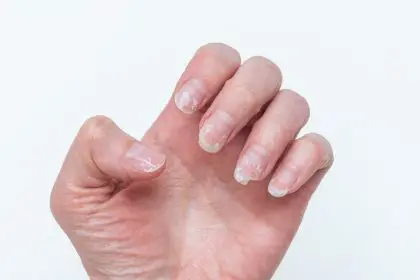We’ve all been there. That tickle in your nose hits during a quiet meeting, a formal dinner, or maybe a first date. Your body screams “SNEEZE!” but social etiquette whispers “don’t you dare.” So you pinch your nose, press your finger under your nostrils, or use whatever sneeze-suppression technique you’ve perfected over the years. Problem solved, right? Not exactly. That seemingly innocent habit of holding in sneezes could potentially lead to serious complications, including damage to your brain.
The explosive power you’re containing
Sneezes are surprisingly powerful. When your body decides to expel those irritants from your nasal passages, it does so with impressive force. A typical sneeze travels at speeds up to 100 miles per hour and creates a significant amount of pressure. This isn’t just a gentle release of air, it’s an explosive event designed to forcefully eject particles from your respiratory system.
When you sneeze naturally, all that pressure gets released through your nose and mouth. But when you hold it in, that pressure has to go somewhere. Think about squeezing one end of a balloon, the pressure just moves to another area. In your body, this redirected pressure can travel to places it was never meant to go, including delicate structures connected to your brain.
The force of a suppressed sneeze can be like hitting the brakes on a speeding car. The momentum doesn’t just disappear, it transfers throughout your body in ways that can cause surprising damage.
The path to your brain
Your nose isn’t as far from your brain as you might think. They’re connected by several pathways, including nerves, blood vessels, and even direct openings in your skull base where your olfactory nerves pass through.
When you stifle a sneeze, the pressure that would normally exit through your nose and mouth gets redirected. This pressure can travel up through your eustachian tubes to your middle and inner ears. From there, it’s a short journey to your meninges, the protective coverings of your brain and spinal cord.
The pressure can also be forced back through the nasal passages and up toward the base of your skull, where there are small openings for nerves and blood vessels. In rare but documented cases, this pressure has been enough to cause air to enter spaces where it doesn’t belong, including around your brain.
Real risks to your brain and beyond
Holding in sneezes isn’t just theoretically dangerous. Medical literature contains numerous case reports of serious injuries resulting from this seemingly harmless habit.
One of the most concerning potential complications is pneumocephalus, a condition where air enters the space around the brain. This can create pressure on the brain tissue and potentially lead to headaches, altered consciousness, or even more serious neurological symptoms.
Another risk is air embolism, where air bubbles enter your bloodstream and can potentially travel to your brain, causing a stroke-like event. While extremely rare, cases have been documented where suppressed sneezes led to air entering blood vessels with serious consequences.
The pressure from a stifled sneeze can also rupture small blood vessels in your eyes, ears, or even in your brain, potentially causing bleeding. These ruptures can range from harmless broken blood vessels in the eyes to more serious bleeding that could put pressure on your brain tissue.
Beyond your brain, holding in sneezes can damage other structures in your head and neck. There have been cases of ruptured eardrums, damaged sinuses, and even torn throat tissues from particularly forceful suppressed sneezes.
Warning signs of sneeze-related injuries
If you’ve been in the habit of holding in your sneezes, it’s important to recognize potential warning signs that something might be wrong. Seek medical attention if you experience:
- Severe headache immediately following a suppressed sneeze
- Changes in vision or hearing after holding in a sneeze
- Swelling or pain in your throat or neck
- A feeling of fullness or pressure in your head that doesn’t go away
- Dizziness or disorientation following a stifled sneeze
- Unusual sounds when breathing, speaking, or moving your head
- Fluid leaking from your ears or nose after suppressing a sneeze
While serious complications are rare, they do happen, and the earlier you seek treatment, the better the outcome is likely to be.
The safer way to sneeze
You don’t need to let loose with a window-rattling “ACHOO!” in every quiet setting to stay safe. There are less risky ways to handle an inconveniently timed sneeze.
Instead of completely suppressing a sneeze by pinching your nose shut, try reducing its intensity. Keep your mouth open slightly to allow pressure to escape while using a tissue to catch the spray. This allows the pressure to release while still keeping the volume and mess to a minimum.
If possible, simply excuse yourself briefly when you feel a sneeze coming on. A quick trip to the restroom or hallway takes just seconds and eliminates the risk completely.
For those in settings where sneezing might be particularly problematic, like surgeons in an operating room, wearing a mask can help reduce the trigger factors that cause sneezing in the first place.
Remember that sneezing serves an important purpose, clearing irritants and potentially infectious particles from your respiratory system. Regularly suppressing this natural reflex might leave those particles in your nasal passages where they can cause more irritation or even infection.
The bottom line
Your mother probably taught you to cover your mouth when you sneeze, but she might not have mentioned that completely suppressing that sneeze could potentially lead to serious injury, including damage to your brain. While catastrophic complications are rare, they’re serious enough to warrant changing this common habit.
Next time you feel that familiar tickle, remember that the momentary social awkwardness of a proper sneeze is far preferable to the potential health risks of holding it in. Your brain will thank you for letting that sneeze flow freely, even if your dinner companions might be momentarily startled.
In a world full of health worries, this is one risk that’s particularly easy to avoid. Just let it out, cover appropriately, and sneeze your way to better neurological safety. Sometimes the body’s natural reflexes are best left to do their job without our well-intentioned interference.












